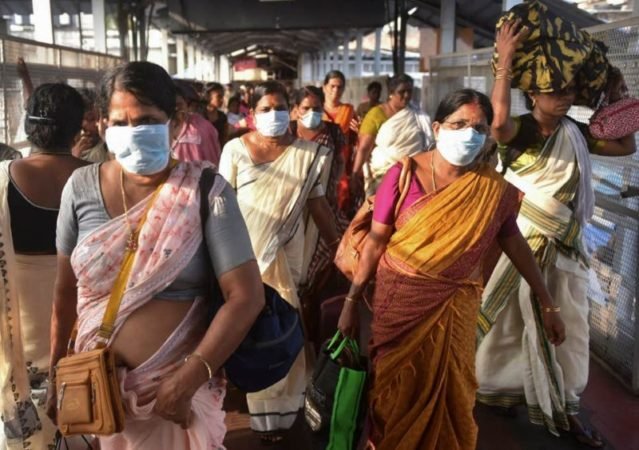Women empowerment in India: Will COVID-19 result in a setback?

There is no tool for development more effective than the empowerment of women. This statement is somewhat contradictory and self – explanatory given today’s circumstances. As the world is holding its breath and praying endlessly for a miraculous escape from the coronavirus outbreak, it is the women leaders and countries led by these enigmatic figures who are outdoing others. Although this might sound wrong, for each country is fending itself and trying its very best, yet countries with women heads like Germany, New Zealand etc. have shown the world, that if you need something done, tell it to a woman. Yet, there is another side to this coin where a purported rise has been seen in the number of domestic violence cases across the globe.
The global pandemic that has brought the world to its knees and closer than ever in the face of deep distress will be facing new challenges post COVID-19. But the issues that have taken a backfoot because of the highlighted pandemic are rising in number and showing how very weak we are as human beings and we need to showcase our power over the weak to suffice and caress our egos. There has been a rise in the reports of domestic violence cases all across the world ever since the lockdown. Is it because that women have nowhere to go and face the atrocities and rage of uncouth partners or is it because that even in the face of adversary, women are seen as existences rather than as humans and treated the same way? The questions are tough, but the answers are tougher and vague because no one is in the state to answer them or are probably dodging them. The governments are in crisis mode and are having to look at the COVID-related consequences for all social ills, such as access to housing and food security, especially for children. It is the global calamity and the effect that this has on society as a whole. One of the main reasons for the failure of states to address domestic violence is because the lofty campaigning and high-level promises lack detailed and properly funded interventions.

The complaints of domestic violence have increased since the lockdown, in some countries by as much as 50 percent. 1 in 3 women faces some form of partner harassment as per the reports by the WHO. Women are forced to remain at home because of the lockdown and do not have recourse to regular points of assistance. Closer home, after Prime Minister Narendra Modi announced the nationwide lockdown the National Commission for Women (NCW), which receives complaints of domestic violence from across the country, has recorded more than twofold rise in gender-based violence in the national Coronavirus lockdown period. The total complaints from women rose from 116 in the first week of March (March 2-8), to 257 in the final week (March 23-April 1).
A significant aspect responsible for the surge in domestic abuses are domestic chores. Gendered roles, the world over have placed domestic work on women’s shoulders, which is socially and culturally often demarcated as “women’s work.” Under lockdown conditions, domestic work can be especially taxing if it is not divided equitably. Coronavirus has exposed us to our dependence on house help. Most families don’t have live-in help and with the lockdown part-timers are unavailable. With housekeeping staff being unavailable, the expectation is for women to bear the load, and chances of violence increase if she fails to do so.” Due to social norms, women already perform 76.2% of the total hours of unpaid care work, more than three times as much as men. During public health crises such as COVID-19, care burdens dramatically increase to include caring for the sick, vulnerable elderly family members, and children who are home due to school closure. This not only exposes women and girls to contracting the virus from infected family members, but also reduces time spent on generating an income, operating a business, or other economic activity. While there are laws in place to protect against domestic abuse, it is not easy for the judicial system to break into the stranglehold of the patriarchal family. Not used to getting their hands dirty, many men are struggling to cope. They feel they are being bossed around, to do the dishes, wash their clothes. Their ego is getting bruised as men are unable to stand being told to help. Stereotypical ideologies exist – it’s the woman’s job to cook, clean, wash. It’s the man’s job to earn. So even though we seem to have progressed in paying lip service to be ‘liberal’, the true test is in the living. And this confinement is throwing up the ‘real’ mindsets of partners.” Neither is there societal will nor the redressal mechanisms available to women who are subjected to domestic violence. For, in the quagmire of disquieting fear and uncertainty, there is one indisputable fact: The lockdowns may end but violence against women will not.

Post COVID-19 there will be a clamour for resources including jobs and capital and the women might face hostilities at their workplaces. The International Labor Organization estimates that 195 million jobs could be eliminated globally due to the pandemic with a majority in sectors predominated by women. Furthermore, over 740 million women around the world work in the informal sector and as low-wage workers, employment that is vulnerable to elimination due to COVID-19 and which often lacks protections against exploitation and harassment. Migrant women working in non-essential service industries such as foodservice and hospitality and domestic workers in predominantly female-heavy sectors (e.g., housekeeping, childcare) are particularly vulnerable to being laid off or exploited for their labour during COVID-19. Women might not face discrimination at the workplace right away, but once it sets in, it will be difficult for organizations to provide women with the necessary biological offs and it might reflect even in their hiring. In a world traumatized by past pandemics, the clues to the future lie in the past. The rhythm of history has been periods of stability and prosperity followed by a descent into instability. As we try to understand how the COVID-19 pandemic may transform our lives, the present may be one of those times when we need to look to the past to get a glimpse of what lies ahead for society. In stable times, people look outward; in unstable times societies turn inward. When instability rules, people take out “insurance” of various sorts. They turn to families, tighten ties to the community, and accept the trade-off that these deeper entanglements limit opportunities for exceptional wealth for any one individual. Expertise becomes more important. Amid renewed xenophobia, people tend to cluster with their own.


















